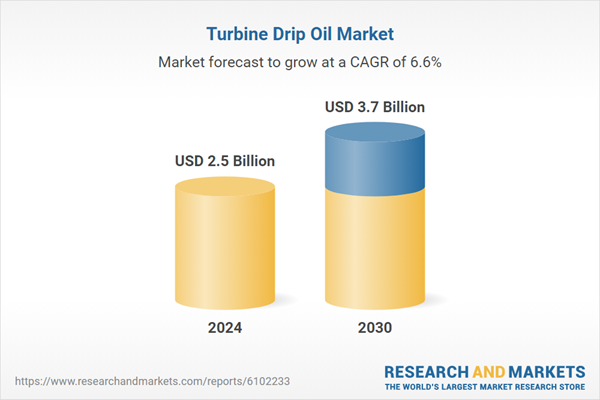Speak directly to the analyst to clarify any post sales queries you may have.
10% Free customizationThis report comes with 10% free customization, enabling you to add data that meets your specific business needs.
A notable shift toward high-performance synthetic and bio-based lubricants - valued for their thermal stability, oxidation resistance, and extended life - is influencing industry trends. Environmental regulations around emissions and biodegradability are prompting industries to adopt sustainable lubricant solutions. Moreover, the focus on minimizing maintenance and maximizing operational reliability is encouraging the use of advanced drip oils. Continuous innovations in turbine technology and lubricant formulations are further supporting market growth across established and emerging markets.
Key Market Drivers
Rising Demand for Power Generation and Industrial Turbines
The expansion of turbine-based energy generation and industrial infrastructure is a key factor driving the Global Turbine Drip Oil Market. As nations invest in expanding their electricity supply to support urbanization and industrial growth, turbines play a central role, especially in combined-cycle plants where gas and steam turbines are used together.Turbine drip oils are essential for ensuring lubrication, operational efficiency, and equipment longevity. This trend is particularly strong in Asia-Pacific countries such as China, India, and Indonesia, where energy infrastructure projects are increasing rapidly. Additionally, industries like manufacturing and oil & gas rely heavily on turbines for processes such as pumping and energy generation. The continued growth in oil and gas exploration - especially offshore and deep-water operations - requires durable and high-quality turbine lubricants, further elevating market demand.
Key Market Challenges
Increasing Regulatory Pressure and Environmental Compliance
Environmental regulations represent a major challenge for the turbine drip oil market, especially in regions such as North America, Europe, and parts of Asia. Regulatory bodies are imposing strict standards on lubricant usage, waste disposal, and emissions to minimize environmental harm. Traditional mineral oil-based drip oils are facing scrutiny due to their non-biodegradability and potential toxicity. Regulatory frameworks such as the EPA in the U.S. and REACH in the EU are pushing industries to transition to safer, biodegradable alternatives. However, switching to bio-based or synthetic alternatives presents challenges related to higher costs, compatibility with older turbines, and availability of supply chains, creating adoption hurdles for some market segments.Key Market Trends
Growing Adoption of Synthetic and Bio-Based Drip Oils
An important trend in the Turbine Drip Oil Market is the shift from conventional mineral-based lubricants to synthetic and bio-based alternatives. This transition is driven by the demand for higher efficiency, longer service intervals, and improved compliance with environmental regulations. Synthetic oils such as polyalphaolefins (PAOs) and esters provide superior lubrication under extreme operational conditions, including high temperatures and pressures, making them ideal for power generation, aerospace, and marine applications. Bio-based drip oils, derived from renewable sources like vegetable oils, offer biodegradability and low toxicity, making them suitable for environmentally sensitive areas such as hydroelectric plants and offshore platforms. Regulatory mandates such as the EPA’s Vessel General Permit (VGP) and the EU’s REACH directive are reinforcing this shift toward eco-friendly lubrication solutions.Key Market Players
- ExxonMobil Corporation
- Royal Dutch Shell plc
- Chevron Corporation
- BP p.l.c.
- TotalEnergies SE
- Petro-Canada Lubricants Inc. (a HollyFrontier company)
- Fuchs Petrolub SE
- Valvoline Inc.
Report Scope:
In this report, the Global Turbine Drip Oil Market has been segmented into the following categories, in addition to the industry trends which have also been detailed below:Turbine Drip Oil Market, By Product Type:
- Mineral Oil-based Turbine Drip Oil
- Synthetic Turbine Drip Oil
- Bio-based Turbine Drip Oil
Turbine Drip Oil Market, By Application:
- Steam Turbines
- Gas Turbines
- Hydro Turbines
Turbine Drip Oil Market, By Region:
- North America
- United States
- Canada
- Mexico
- Europe
- Germany
- France
- United Kingdom
- Italy
- Spain
- Asia Pacific
- China
- India
- Japan
- South Korea
- Australia
- South America
- Brazil
- Colombia
- Argentina
- Middle East & Africa
- Saudi Arabia
- UAE
- South Africa
Competitive Landscape
Company Profiles: Detailed analysis of the major companies present in the Global Turbine Drip Oil Market.Available Customizations:
With the given market data, the publisher offers customizations according to a company's specific needs. The following customization options are available for the report.Company Information
- Detailed analysis and profiling of additional market players (up to five).
This product will be delivered within 1-3 business days.
Table of Contents
Companies Mentioned
- ExxonMobil Corporation
- Royal Dutch Shell plc
- Chevron Corporation
- BP p.l.c.
- TotalEnergies SE
- Petro-Canada Lubricants Inc. (a HollyFrontier company)
- Fuchs Petrolub SE
- Valvoline Inc.
Table Information
| Report Attribute | Details |
|---|---|
| No. of Pages | 188 |
| Published | June 2025 |
| Forecast Period | 2024 - 2030 |
| Estimated Market Value ( USD | $ 2.5 Billion |
| Forecasted Market Value ( USD | $ 3.7 Billion |
| Compound Annual Growth Rate | 6.6% |
| Regions Covered | Global |
| No. of Companies Mentioned | 8 |









